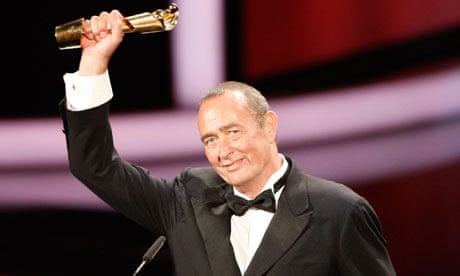In 1977, Wim Wenders proclaimed: "Never before and in no other country have images and language been abused so unscrupulously as here [in Germany]. Nowhere else have people suffered such a loss of confidence in images of their own, their own stories and myths as we have." The film producer Bernd Eichinger, who has died of a heart attack aged 61, went further than most to bring back that confidence to German cinema.
Still suffering from the fatal legacy of nazism, German cinema emerged from the doldrums of the 50s and 60s into the next decade with directors such as Wenders, Rainer Werner Fassbinder and Volker Schlöndorff. Eichinger dreamed of re-establishing the glory days of German cinema of the 1920s, when the world-renowned film company Ufa was both a commercial and artistic success. He believed that art without financial success, which attracted small audiences, was a wasted effort, despite critical acclaim.
He realised his dream by becoming Germany's only true movie mogul, one of the few to achieve success both at home and abroad by breaking into Holly- wood. Among his English-language hits were Wolfgang Petersen's The NeverEnding Story (1984), which combined animated creatures with live actors; Jean-Jacques Annaud's The Name of The Rose (1986), an adaptation of Umberto Eco's 14th-century murder story; Tom Tykwer's Perfume, The Story of a Murderer (2006), from the novel by Patrick Süskind; Corey Yuen's DOA: Dead or Alive (2006), a martial arts movie; and the four Resident Evil films (2002, 2004, 2007, 2010), derived from video games.
Eichinger also produced numerous German films that were the life-blood of the industry: Der Bewegte Mann (The Most Desired Man, 1994), which made a star of Til Schweiger; Nirgendwo in Afrika (Nowhere in Africa, 2001), which won the best foreign film Oscar; and the two Oscar-nominated films that looked unflinchingly at Germany's past, Oliver Hirschbiegel's Downfall (2004), on the last days of Hitler, and Uli Edel's The Baader Meinhof Complex (2008), on the Red Army Faction terrorist group of the 1970s. The latter was among the most expensive German productions ever mounted, at €6.5m.
Eichinger was born in Neuburg an der Donau, north-west of Munich, into a middle-class family. Soon after leaving the University of Television and Film in Munich, where he studied film direction, Eichinger formed his own company in Berlin, Solaris Film, which established his credentials as an initiator of so-called "art films" before he became associated with blockbusters. His first production, Wenders' Falsche Bewegung (Wrong Movement, 1975), with a screenplay by Peter Handke, updating Goethe's Wilhelm Meister's Apprenticeship, was a bleak and cryptic road movie travelling across a Germany that is seen as a figurative and literal wasteland, with suggestions of the Nazi past. The film saw the debut of 14-year-old Nastassja Kinski, as a juggler.
Die Wildente (The Wild Duck, 1976), a faithful adaptation by the director-writer Hans W Geissendörfer of the first of Ibsen's symbolist plays, was shot in seven weeks in a studio in Vienna, with Jean Seberg (in her last film) and Bruno Ganz, who was to play Hitler in Downfall almost three decades later. The following year, Eichinger demonstrated his audacity by giving Hans Jürgen Syberberg carte blanche to make his four-hour Hitler: Ein Film Aus Deutschland (Hitler: A Film From Germany), a phantasmagoric panorama of German history, culture and mythology, before, during and after Hitler to reveal "the Hitler in us all", and showing the Führer as a great impresario who mesmerised the masses.
Continuing to take risks, Solaris also produced Die Konsequenz (The Consequence, 1977), about the romantic relationship between an imprisoned gay actor (Jürgen Prochnow) and the warder's young son. Shot in monochrome tones appropriate to the pall of depression that hangs over it, the film, the first to gain Petersen international acclaim, was an effective plea for tolerance and an indictment of the prison service.
In 1979, Eichinger bought a large stake in the Munich-based production and distribution company Constantin Film, which he ran as a hands-on producer for over 30 years, making it one of the most successful businesses in Germany. At the same time, Solaris continued to make films such as Christiane F (1981), Edel's debut feature, a bleak and harrowing investigation into the teenage drug scene in Berlin, which made a huge profit at the box office.
Constantin focused more on mainstream movies and the international market, particularly targeting the US. While running the company, Eichinger also directed a few films, none of which was a success, and wrote the screenplays for Downfall and The Baader Meinhof Complex. Both were controversial, mainly because the former depicted Hitler not as a monster, but as a tragic figure brought low by incompetent generals and so-called friends.
In answer to those who criticised the latter because it glamorised the terrorists and treated the subject in a superficial manner, Eichinger replied: "Andreas Baader and Gudrun Ensslin had a real sense of style and pose – the fast cars, the clothes, the hair, the sunglasses … all that was very deliberate and it worked. They were like political rock stars. Apart from anything else, they had great sex appeal. We had to show that in order to convey why people were mesmerised by them."
At the time of his death, the seemingly indefatigable Eichinger, noted for his white plimsolls, was working on a film about Natascha Kampusch, the Austrian girl who was kidnapped and held hostage in a basement for more than eight years.
Eichinger is survived by his wife Katja Hoffman, a journalist, and the actor and TV presenter Nina Eichinger, a daughter from a previous relationship.
